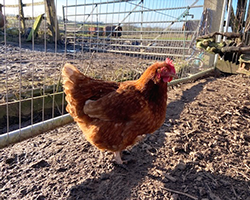Avian influenza A(H5N8) infects humans in Russian Federation

WHO
Russian authorities have reported 7 poultry farm workers aged 29 to 60 years infected with the A(H5N8) strain of avian influenza, also known as bird flu. This is the first reported detection of this strain of avian influenza in humans. The human infections occurred on a poultry farm in Astrakhan, Russian Federation, and were reported to WHO by Russian health officials via channels of the International Health Regulations (2005).
Concerns were raised when 101 000 out of 900 000 egg-laying hens on the farm died in early December 2020. An investigation by Russian veterinary public-health authorities detected avian influenza A(H5N8), which was then confirmed by the World Organisation for Animal Health (OIE) Reference Laboratory and the Federal Centre for Animal Health in the city of Vladimir, Russian Federation.
No clinical evidence of onward transmission
Follow-up tests on the 7 workers from the poultry farm suggested recent infection with the virus, though they showed no symptoms. There was no clinical evidence of onward transmission to families or close associates of the workers. Further information on serology among contacts of the positive cases is required to fully assess the risk.
Dr Richard Pebody, who leads the High Threat Pathogen Team at WHO/Europe, was quick to reassure: “The people who were reported to be infected did not develop symptoms and they were all exposed to an infected poultry flock in the course of their work. The infection does not appear to have come from other human beings – which is good news.”
Dr Pebody added, “The poultry flock has been culled and no further infections in humans have been found. It is also encouraging that this incident shows the system that alerts local and international authorities is working. However, this underlines the ongoing importance of global surveillance in the face of constantly evolving influenza viruses. Changes to the influenza virus must be closely monitored in animals and humans alike; this is a good example of the One Health approach, recognizing that human and animal health are intertwined and depend on each other.”
Low risk of human-to-human transmission
Based on available information, the risk of human-to-human transmission remains low and WHO recommendations have not changed as a result of the incident. When avian influenza is circulating in an area, farms and contact with live animals, for example in markets, should be avoided. Precautions must be taken by those working with poultry.
WHO is now following up with public health authorities in the Russian Federation and other relevant organizations. Although this strain of influenza has not previously been known to affect humans, it has been detected in farmed and wild birds in countries across the European Region, including Bulgaria, Czechia, Germany, Hungary, Kazakhstan, the Netherlands, Poland, Romania and now the Russian Federation.



